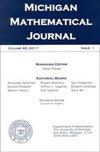最大算术度点的Zariski密度
IF 0.6
3区 数学
Q2 MATHEMATICS
引用次数: 4
摘要
给定一个数域上的投影变换上的占优有理自映射,我们可以定义有理点上的算术度数。已知任意点的算术次小于或等于第一动力次。在本文中,我们证明了射影变体上的自模态存在密集的具有最大算术次的$\overline{\mathbb Q}$-有理点(即其算术次等于第一次动力次)。对于一元变数和阿贝尔变数,我们证明了在一个足够大的数域上存在大量算术次极大的有理点。我们还在附录中对Kawaguchi和Silverman的结果进行了推广。本文章由计算机程序翻译,如有差异,请以英文原文为准。
Zariski Density of Points with Maximal Arithmetic Degree
Given a dominant rational self-map on a projective variety over a number field, we can define the arithmetic degree at a rational point. It is known that the arithmetic degree at any point is less than or equal to the first dynamical degree. In this article, we show that there are densely many $\overline{\mathbb Q}$-rational points with maximal arithmetic degree (i.e. whose arithmetic degree is equal to the first dynamical degree) for self-morphisms on projective varieties. For unirational varieties and abelian varieties, we show that there are densely many rational points with maximal arithmetic degree over a sufficiently large number field. We also give a generalization of a result of Kawaguchi and Silverman in the appendix.
求助全文
通过发布文献求助,成功后即可免费获取论文全文。
去求助
来源期刊
CiteScore
1.20
自引率
11.10%
发文量
50
审稿时长
>12 weeks
期刊介绍:
The Michigan Mathematical Journal is available electronically through the Project Euclid web site. The electronic version is available free to all paid subscribers. The Journal must receive from institutional subscribers a list of Internet Protocol Addresses in order for members of their institutions to have access to the online version of the Journal.

 求助内容:
求助内容: 应助结果提醒方式:
应助结果提醒方式:


